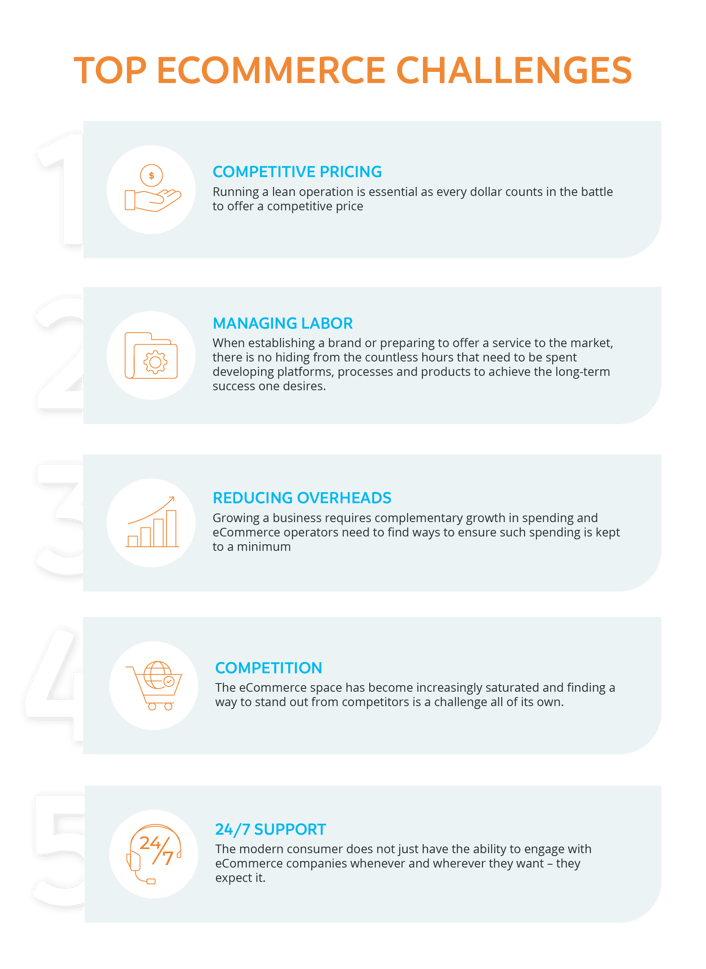6 benefits of outsourcing eCommerce tasks
In today's competitive eCommerce landscape, businesses are constantly looking for ways to optimize their operations, improve efficiency, and stay ahead of the competition. One strategy that many eCommerce businesses are turning to is outsourcing. Outsourcing can offer a range of benefits, from cost savings and improved efficiency to access to specialized services and a global talent pool.

In this blog, we'll explore the top six benefits of outsourcing for eCommerce tasks, as well as when and why to outsource.
What is eCommerce outsourcing?
eCommerce outsourcing refers to the process of hiring a third-party service provider to handle some or all of the tasks associated with running an online store. These tasks may include anything from product sourcing and fulfilment to website development and customer service. By outsourcing these tasks, eCommerce businesses can focus on their core competencies, such as product design, marketing and branding, and delegate the rest to experts who can provide quality services at a lower cost.
When to outsource?
Knowing when to outsource is critical for eCommerce businesses looking to optimize their operations and improve their bottom line. Some key indicators that it may be time to outsource include an overworked in-house staff, a need for specialized expertise and a desire to scale operations quickly and efficiently. By outsourcing at the right time, eCommerce businesses can streamline their processes, free up internal resources and gain a competitive edge in the market.
While outsourcing can be beneficial for many eCommerce businesses, it's important to identify the right time to do so. Here are some key indicators that may suggest it's time to outsource:
- Overwhelmed staff: if your in-house staff is overworked and struggling to keep up with the workload, outsourcing can help alleviate some of the pressure and allow your team to focus on core business functions.
- Lack of expertise: if you lack the expertise or resources to complete a task or project, outsourcing can be a good option. This is particularly true for complex or technical tasks, such as website development or search engine optimization (SEO).
- Need for cost savings: if you're looking to reduce costs or improve profit margins, outsourcing can be a cost-effective solution. By outsourcing to a third-party service provider, you can save on labor costs, equipment expenses and other overhead costs associated with hiring in-house staff.
What challenges are eCommerce businesses facing?
eCommerce businesses are facing a range of challenges in today's fast-paced and competitive market. These challenges include the need to keep up with evolving consumer demands, increased competition, and the need to balance quality with speed and cost.

- Competitive pricing
Building an online business requires a stringent focus on lean management. With their ability to compare product prices at the click of a button, online customers are renowned for being price-conscious and every effort must be made to establish competitive price offers. It has been estimated that online shoppers visit three websites before making a purchase1, while price comparison websites further the need for online stores to compete not only on service but price. With that in mind, running a lean operation is essential as every dollar counts in the battle to offer a competitive price. - Reducing overheads
An overhead is any cost not associated with the creation of your product or services. The rent you pay for your premises, the office equipment your staff use, the bills you pay for electricity or the like – they are all overheads that cut into your bottom line. And this is where eCommerce thrives. Where overheads for traditional bricks and mortar businesses can be quite high, the very nature of eCommerce operations means they are renowned for being low-overhead businesses.
Hosting a website is certainly a lot cheaper than operating a physical shopfront and every effort should be made to reduce overhead costs where possible. The challenge comes when you are simultaneously trying to scale your online operations. Growing a business requires complementary growth in spending and eCommerce operators need to find ways to ensure such spending is kept to a minimum. - Managing labor
One thing eCommerce has in common with traditional businesses is the start-up phase is labor intensive. When establishing a brand or preparing to offer a service to the market, there is no hiding from the countless hours that need to be spent developing platforms, processes and products to achieve the long-term success one desires. Then, even when the initial hard work is done, ongoing maintenance is labor-intensive. The cost of employing and training staff is among the greatest expenses to bear for any organization, particularly in lean eCommerce operations that thrive on low overheads. - Competition
While the ability to deliver competitive pricing, products and service is a must for any business, the cutthroat world of eCommerce places even more pressure on owners and managers. With so many organizations focused on the sector, the eCommerce space has become increasingly saturated and finding a way to stand out from competitors is a challenge all of its own. Ensuring your website looks super-professional and your platform’s SEO are just two factors that are crucial to attracting new customers to a business, let alone implementing background processes to deliver quality results. In the fast-paced online world, speed to market is also imperative and every effort must be made to ensure you are not only keeping pace with change but staying ahead of it. - 24/7 support
Unlike a shopfront that closes its doors overnight, the online world never sleeps. Mobile devices have changed the way we live. The modern consumer does not just have the ability to engage with eCommerce companies whenever and wherever they want – they expect it. Hence, eCommerce businesses need to ensure they are able to meet 24/7 expectations, along with having their own IT support in place to address any concerns or issues that may arise.
Six benefits of outsourcing for eCommerce
Outsourcing can offer a range of benefits for eCommerce businesses, from cost savings and improved efficiency to access to specialized services and a global talent pool. By leveraging these benefits, eCommerce businesses can streamline their operations, stay ahead of the competition and position themselves for long-term growth and success.

- Focus on core competencies. Outsourcing allows eCommerce businesses to focus on their core competencies, such as product design, marketing and branding. By delegating the rest to experts, businesses can improve their overall performance and competitiveness.
- Improved efficiency. Outsourcing can improve efficiency by allowing eCommerce businesses to streamline their operations and reduce the time and resources required to complete tasks. Service providers can also offer faster turnaround times and 24/7 support, which can be particularly beneficial for customer service and website maintenance.
- Access to specialized services. eCommerce businesses can access a wide range of specialized services by outsourcing to third-party service providers. These services may include product sourcing and fulfilment, website development, digital marketing and customer service.
- Scalability. Outsourcing allows eCommerce businesses to scale their services up or down as needed, without having to worry about the overhead costs associated with hiring and firing staff.
- Cost savings. Outsourcing can be a cost-effective solution for eCommerce businesses, as it eliminates the need to hire and train in-house staff or invest in expensive software and equipment.
- Global talent pool. You can tap into a diverse pool of talent from around the world to access skills and expertise that may not be available locally. This can lead to higher quality work, faster turnaround times and a competitive advantage in the market.
What roles can you outsource for eCommerce?
With many local eCommerce staff already set up to communicate and collaborate remotely and most of the actual work performed using cloud-based software, the eCommerce industry is particularly well suited for outsourcing. Some of the sector’s more frequently outsourced roles include:
- Accounts payable and accounts receivable specialists
- Accountants
- Bookkeepers
- Customer service representatives
- Digital marketing specialists
- Sales support
- Software developers
- Technical support specialists
- Telemarketers
- Web developers (both front-end and back-end).
Outsourcing is clearly a positive step for many eCommerce operations, with the practice allowing them to be as nimble and cost-effective as possible in an environment where such attributes are crucial.
Reference:
[1] https://marketingland.com/consumer-behavior-and-todays-publishers-why-advertisers-love-the-affiliate-channel-18048
Popular posts
Browse by topic
- Accounting
- Accounting & Finance
- All Industries
- Banking
- BPO/RPO/HRO
- Communication
- CSR & ESG
- Customer & Client Acquisition
- Customer Experience
- Cybersecurity
- Cybersecurity & Compliance
- Data Management
- Digital Operations
- Digital Transformation
- eCommerce
- Education
- Employee Engagement
- Engineering & Construction
- Financial Services
- Healthcare
- Hospitality and tourism
- HR & Recruitment
- Information Technology
- Insurance
- Legal Services
- Logistics
- Offshoring & Outsourcing
- Outsourcing
- Professional Services
- Real Estate
- Retail & eCommerce
- Startups
- Talent Acquisition and Retention
- Technology
- Trends & Guides
- Workforce Integration
Sign up for the offshoring eCourse
12 in-depth and educational modules delivered via email – for free
Related Posts
How employers can reduce healthcare costs
A lot has been written about how the working world has changed in the wake of the COVID-19 pandemic. Where many managers once linked productivity..
Defining data – the difference between data privacy, data security and data protection
There is no shortage of issues that can inspire sleepless nights for business leaders. Talent shortages, regulatory pressures, shrinking budgets and..
Is offshore staffing the key to data compliance?
With entire websites dedicated to exposing businesses daily that have been hacked or have had their data breached daily, it’s no wonder why data..

